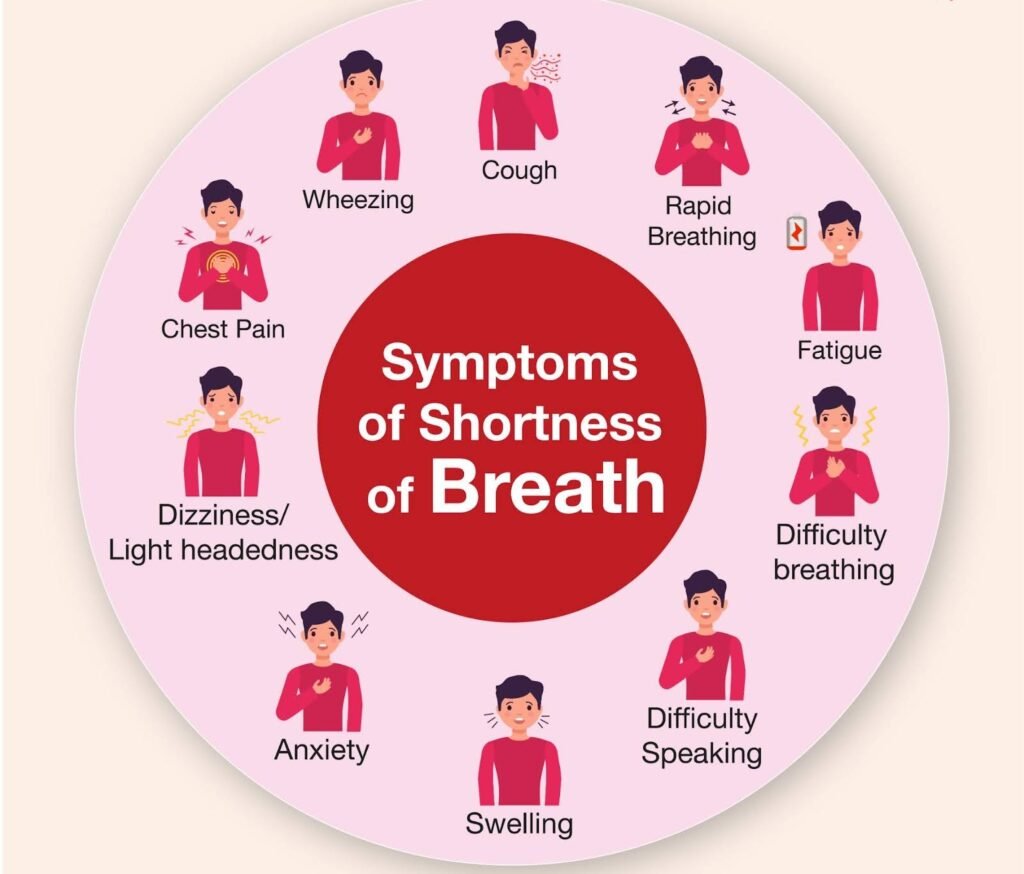Dr. Shilpa Gandhi | Leading Consultant Minimally Invasive Thoracic Surgeon In Nagpur
Meet Our Doctor
Dr. Shilpa Gandhi
MBBS, DNB General Surgery DNB Thoracic Surgery
Dr. Shilpa Gandhi is a trusted and experienced healthcare professional known for her compassionate care and expertise. Committed to delivering personalized treatments and improving patient well-being.


Shortness Of Breath Treatment In Nagpur
Shortness of breath, also known as dyspnea, can be an alarming and uncomfortable symptom. Whether it’s a mild difficulty breathing after physical activity or a more severe condition that interrupts your daily life, finding the right shortness of breath treatment is crucial. This common symptom can stem from various causes, including heart problems, lung conditions, or even stress and anxiety. With expert diagnosis and personalized care, relief is possible.
Shortness of breath, or dyspnea, can be a distressing experience, leaving you feeling like you can’t catch your breath or get enough air. Whether it’s caused by a temporary condition or a chronic health issue, proper shortness of breath treatment is essential for improving your quality of life and addressing any underlying medical concerns. From lung diseases to heart problems, shortness of breath can signal a wide range of health issues that need professional care.
What Is Shortness of Breath?
Shortness of breath is the feeling of being unable to breathe comfortably and get enough air into your lungs. It can be temporary, such as after strenuous exercise, or a sign of an underlying health condition. Common symptoms accompanying shortness of breath include:
- A tight feeling in the chest.
- Difficulty inhaling or exhaling fully.
- Wheezing or coughing.
- Fatigue or dizziness.
Common Causes of Shortness of Breath
Shortness of breath can result from a variety of medical conditions, including:
1. Lung Conditions
- Asthma
- Chronic Obstructive Pulmonary Disease (COPD)
- Pneumonia
- Pulmonary embolism
- Interstitial lung disease
2. Heart Problems
- Congestive heart failure
- Coronary artery disease
- Arrhythmias
3. Other Causes
- Anemia
- Obesity
- Anxiety or panic attacks
- Allergic reactions
- Infections like COVID-19
When Should You Seek Treatment for Shortness of Breath?
It’s essential to consult a healthcare professional if you experience any of a following:
- Persistent or worsening shortness of breath.
- Sudden onset of difficulty breathing.
- Chest pain or pressure along with shortness of breath.
- Blue lips or fingers (cyanosis).
- Difficulty breathing while lying flat.
How Is Shortness of Breath Diagnosed?
To determine the cause of shortness of a breath, your doctor may perform:
Physical Examination
Listening to your lungs and heart to identify abnormalities.Medical History Review
Discussing symptoms, lifestyle habits, and any pre-existing conditions.Diagnostic Tests
- Pulmonary Function Tests (PFTs): Measure lung capacity or airflow.
- Chest X-rays or CT Scans: Visualize lung and chest structures.
- Electrocardiogram (ECG): Check heart rhythm and detect abnormalities.
- Blood Tests: Identify anemia, infections, or oxygen levels.
- Oxygen Saturation Tests: Measure a oxygen level in your blood.
Effective Shortness of Breath Treatments
Treatment for shortness of breath depends on the underlying cause. Common approaches include:
1. Medications
- Bronchodilators: Help open airways for conditions like asthma or COPD.
- Corticosteroids: Reduce inflammation in the airways or lungs.
- Diuretics: Treat fluid buildup in the lungs due to heart failure.
- Antibiotics or Antivirals: Address infections like pneumonia or COVID-19.
2. Oxygen Therapy
For severe cases, supplemental oxygen can help improve oxygen levels in the blood.
3. Pulmonary Rehabilitation
A structured program to strengthen lung function, especially for COPD or interstitial lung disease patients.
4. Lifestyle Changes
- Quitting smoking.
- Maintaining a healthy weight.
- Avoiding allergens or pollutants.
- Practicing breathing exercises for stress or anxiety management.
5. Emergency Interventions
In cases like pulmonary embolism or heart failure, urgent medical treatment or surgery may be necessary.
Preventing Shortness of Breath
While some causes of shortness of breath cannot be prevented, there are steps you can take to lower your risk:
- Stay active to improve cardiovascular and respiratory health.
- Avoid exposure to allergens, pollutants, and smoke.
- Get vaccinated against flu and pneumonia to protect your lungs.
- Treat underlying conditions like asthma, heart disease, or anxiety proactively.Contact Us
Why Choose Professional Shortness of Breath Treatment?
Professional care for shortness of breath ensures you receive a precise diagnosis and a treatment plan tailored to your condition. Benefits include:
- Expert Evaluation: Identifying the root cause of your breathing difficulties.
- Advanced Treatments: Access to the latest medical therapies and technologies.
- Ongoing Support: Guidance to manage chronic conditions and prevent future episodes.
- Improved Quality of Life: Restoring your ability to breathe comfortably and live actively.Book an appointment with Dr. Shilpa Gandhi for specialized thoracic care.



